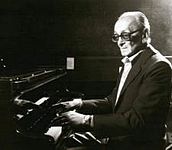Osvaldo Pugliese, Date of Birth, Place of Birth, Date of Death
TweetOsvaldo Pugliese
Argentine pianist, tango composerAbout Osvaldo Pugliese
- Osvaldo Pedro Pugliese (Buenos Aires, December 2, 1905 – July 25, 1995) was an Argentine tango musician.
- He developed dramatic arrangements that retained strong elements of the walking beat of salon tango but also heralded the development of concert-style tango music. Some of his music, mostly since the 1950s, is used for theatrical dance performances.
- In Buenos Aires, Pugliese is often played later in the evening when the dancers want to dance more slowly, impressionistically and intimately. Pugliese is a great choice for slower tango dance music, but the arrangements can be a bit more rhythmically challenging than those played by other orchestras.
- 'Recuerdo' (1924) and 'La yumba' (1946) are two of Pugliese's most popular tangos. Pugliese was outspoken in his political opinions.
- His communist sympathies, though never violent, at times earned him the hostility of those in power.
- Populist President Juan Perón is said to have had labor union heavies once intimidate Pugliese by locking him in a sinking boat, rescuing him at the last minute; though the alleged 1949 incident has never been proven (Pugliese, likewise, seldom spoke of it publicly), the day Pres.
- Perón awarded the great pianist the Order of May (Argentina's highest civilian award), he embraced Pugliese, saying: "Thank you, maestro, for forgiving".
- Pugliese reportedly responded, "Forgive what?" Pugliese was a man of integrity and humility.
- He spent years in jail due to his beliefs.
- The government also restricted his recordings to 10 per year.
- As a communist, he organized his orchestra as a collective paid his orchestra by their contribution, and earned their loyalty.
- Quite rare, his core orchestra members (Osvaldo Ruggiero 1st bandomeon, Enrique Camerano 1st violin, Julio Carrasco and Oscar Herrero 2nd violins, Alcides Rossi on double bass) stayed with him nearly 30 years (1939-1968).
- When he was in jail, he still wrote arrangements and the orchestra still performed, and placed a red carnation on the keyboard of the piano in his honor. At age 80, he was allowed in 1985 to give a concert in Teatro Colon, in Buenos Aires.
- He received 5 standing ovations.
- With characteristic humility he said: “The truth is...it’s a night of the people, of the masses, lovers of our genre, our beloved genre, tango.”
Read more at Wikipedia
See Also
- Famous People's Birthdays on 02 December, Argentina
- Famous People's Birthdays in December, Argentina
- Famous composer's Birthdays on 02 December, Argentina
- Famous composer's Birthdays in December, Argentina
- Famous pianist's Birthdays on 02 December, Argentina
- Famous pianist's Birthdays in December, Argentina


 Date of Birth:
Date of Birth:  Place of Birth: Buenos Aires, Argentina
Place of Birth: Buenos Aires, Argentina